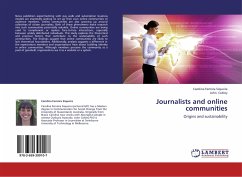News publishers experimenting with pay walls and subscription business models are essentially seeking to set up their own online communities of audience members. Online communities are also growing up around collectives of citizen journalists. Both of these phenomena make research into such communities potentially valuable. Online communities are being used to complement or replace face-to-face interactions, especially between widely distributed individuals. This study explores the theoretical and practical factors that contribute to the sustainability of such communities. The findings suggest that online communities are likely to lack theoretical foundations. Additionally, analysis suggests a difference in the expectations members and organisations have about building identity in online communities. Although members perceive the community as a pool of goodwill, organisations see it as a website or a system.
Bitte wählen Sie Ihr Anliegen aus.
Rechnungen
Retourenschein anfordern
Bestellstatus
Storno








